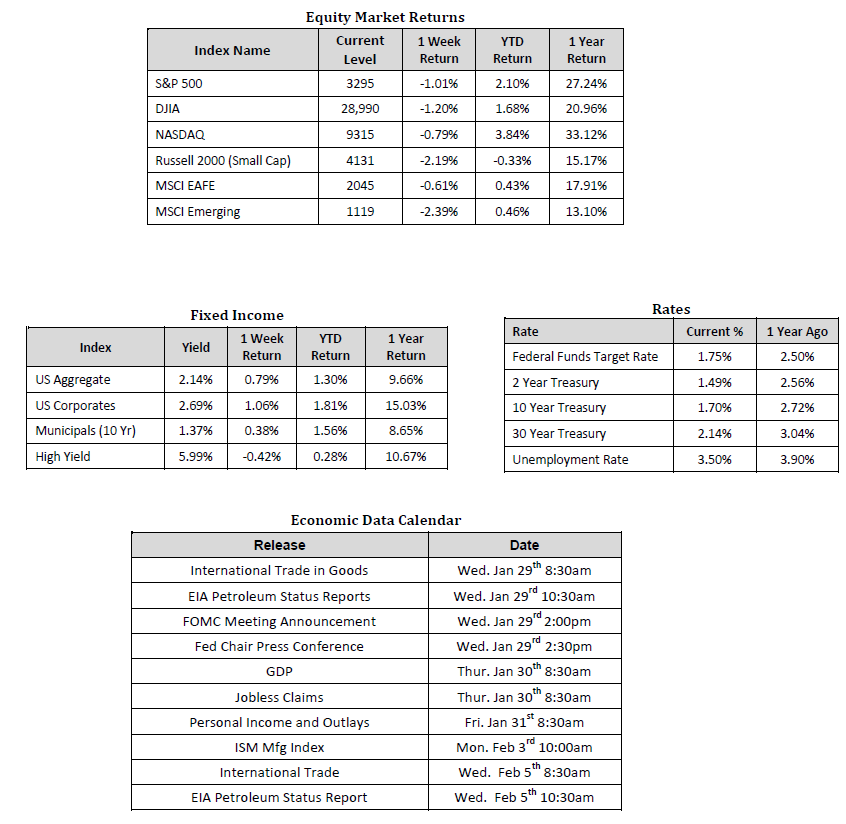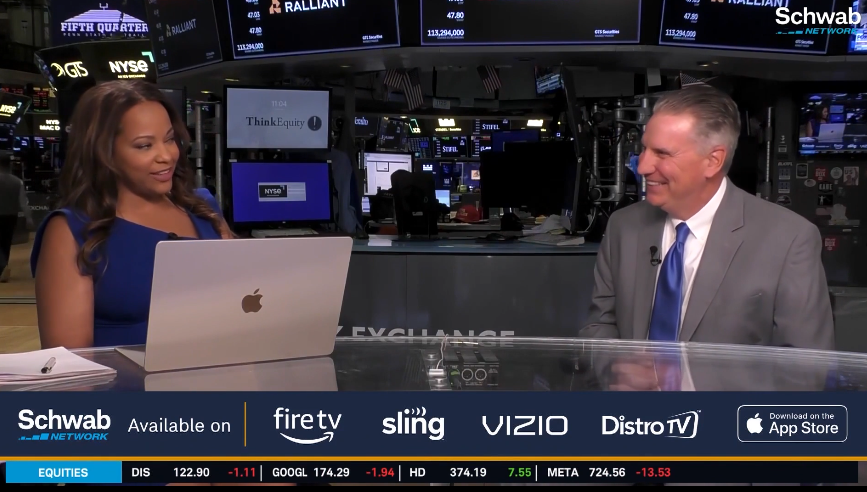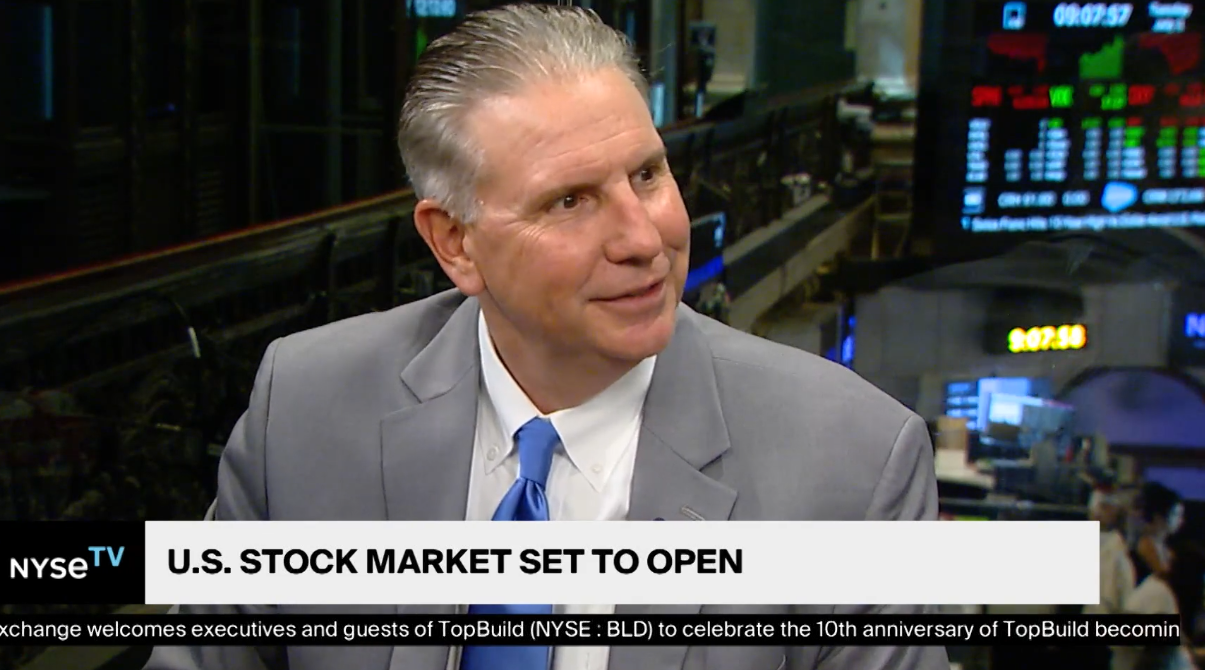
How Concerned Should Investors be about the Coronavirus?
Market Overview

Sources: Sources for data in tables: Equity Market and Fixed Income returns are from JP Morgan as of 1/31/2020. Rates and Economic Calendar Data from Bloomberg as of 1/31/2020. International developed markets measured by the MSCI EAFE Index, emerging markets measured by the MSCI EM Index. Sector performance is measured using GICS methodology.
Happening Now
Further upside in global equity markets was held in-check as investors weighed the investment implications of a rapidly spreading coronavirus. In the U.S., the S&P 500 Index fell to a level of 3,226, representing a loss of 2.10%, while the Russell Midcap Index slumped 2.42% last week. Moreover, the Russell 2000 Index, a measure of the Nation’s smallest publicly traded firms, retreated 2.89% over the week. Meanwhile, on the international equities front, developed markets fell by 2.50%, while emerging markets lost a whopping 5.09%. Finally, as evidence of the extent of the risk-off sentiment of investors last week, the 10-year U.S. Treasury yield finished the week at 1.51%, substantially lower than the prior week’s closing level of 1.70%.
Investors are paying special attention to the coronavirus and the potential effect that it may have on global economic growth. If you’re looking for additional evidence of investor concern, look no further than last week’s collective performance of emerging market equities, which finished more than 5% lower. But is heightened anxiety amongst investors justified, and should it prompt reactionary changes to one’s portfolio strategy?
In judging what impact the coronavirus is likely to have on global economic growth and, by extension, portfolio returns, let’s first examine its lethality relative to previous contagions. For instance, the 2003 SARS outbreak carried a mortality rate of approximately 10%, whereas the mortality rate for victims of the coronavirus currently sits around 2.2%. For perspective, the average mortality rate for victims of the seasonal flu in the U.S. is 0.05%. Of course, a mortality rate higher than 0 is very unfortunate, but it is encouraging to see that many of the victims of the coronavirus are recovering and being sent home from the hospital.
Another metric to consider when discerning the scope that the coronavirus is likely to have on global economic growth is the rate at which the virus is spreading. In other words, how many healthy people are expected to catch the virus from one sick individual? In 2003, every person infected with SARS subsequently went on to infect 2 to 4 other people, whereas those carrying the coronavirus are currently infecting 1.4 to 2.5 others on average. Again, for perspective, those sick with the seasonal flu typically spread the virus to between 0.9 and 2.1 other people.
Comparing the coronavirus to past viral outbreaks indicates to us that while the virus should be taken seriously, it should not be viewed as having the potential to bring the global economic wheels to a sustained halt at this time. This virus is likely to drag on Chinese GDP for the remainder of the year, but should only drag on U.S. GDP in the 1st quarter and likely ultimately recover by year-end.
Regardless, increased levels of volatility can be expected for the remainder of 2020 for a variety of reasons including, but not limited to, the upcoming November elections in the U.S. This is why we continue to encourage investors to stay disciplined and work with experienced financial professionals to help manage their portfolios through various market cycles within an appropriately diversified framework that is consistent with their objectives, time-frame, and tolerance for risk.
Important Information and Disclaimers
Disclosures: Hennion & Walsh is the sponsor of SmartTrust® Unit Investment Trusts (UITs). For more information on SmartTrust® UITs, please visit www.smarttrustuit.com. The overview above is for informational purposes and is not an offer to sell or a solicitation of an offer to buy any SmartTrust® UITs. Investors should consider the Trust’s investment objective, risks, charges and expenses carefully before investing. The prospectus contains this and other information relevant to an investment in the Trust and investors should read the prospectus carefully before they invest.
Investing in foreign securities presents certain risks not associated with domestic investments, such as currency fluctuation, political and economic instability, and different accounting standards. This may result in greater share price volatility. These risks are heightened in emerging markets.
There are special risks associated with an investment in real estate, including credit risk, interest rate fluctuations and the impact of varied economic conditions. Distributions from REIT investments are taxed at the owner’s tax bracket.
The prices of small company and mid cap stocks are generally more volatile than large company stocks. They often involve higher risks because smaller companies may lack the management expertise, financial resources, product diversification and competitive strengths to endure adverse economic conditions.
Investing in commodities is not suitable for all investors. Exposure to the commodities markets may subject an investment to greater share price volatility than an investment in traditional equity or debt securities. Investments in commodities may be affected by changes in overall market movements, commodity index volatility, changes in interest rates or factors affecting a particular industry or commodity.
Products that invest in commodities may employ more complex strategies which may expose investors to additional risks.
Investing in fixed income securities involves certain risks such as market risk if sold prior to maturity and credit risk especially if investing in high yield bonds, which have lower ratings and are subject to greater volatility. All fixed income investments may be worth less than original cost upon redemption or maturity. Bond Prices fluctuate inversely to changes in interest rates. Therefore, a general rise in interest rates can result in the decline of the value of your investment.
Definitions
MSCI- EAFE: The Morgan Stanley Capital International Europe, Australasia and Far East Index, a free float-adjusted market capitalization index that is designed to measure developed-market equity performance, excluding the United States and Canada.
MSCI-Emerging Markets: The Morgan Stanley Capital International Emerging Market Index, is a free float-adjusted market capitalization index that is designed to measure the performance of global emerging markets of about 25 emerging economies.
Russell 3000: The Russell 3000 measures the performance of the 3000 largest US companies based on total market capitalization and represents about 98% of the investible US Equity market.
ML BOFA US Corp Mstr [Merill Lynch US Corporate Master]: The Merrill Lynch Corporate Master Market Index is a statistical composite tracking the performance of the entire US corporate bond market over time.
ML Muni Master [Merill Lynch US Corporate Master]: The Merrill Lynch Municipal Bond Master Index is a broad measure of the municipal fixed income market.
Investors cannot directly purchase any index.
LIBOR, London Interbank Offered Rate, is the rate of interest at which banks offer to lend money to one another in the wholesale money markets in London.
The Dow Jones Industrial Average is an unweighted index of 30 “blue-chip” industrial U.S. stocks.
The S&P Midcap 400 Index is a capitalization-weighted index measuring the performance of the mid-range sector of the U.S. stock market, and represents approximately 7% of the total market value of U.S. equities. Companies in the Index fall between S&P 500 Index and the S&P SmallCap 600 Index in size: between $1-4 billion.
DJ Equity REIT Index represents all publicly traded real estate investment trusts in the Dow Jones U.S. stock universe classified as Equity REITs according to the S&P Dow Jones Indices REIT Industry Classification Hierarchy. These companies are REITs that primarily own and operate income-producing real estate.



